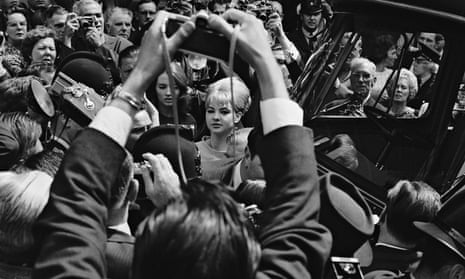It has taken 50 years, but Britain has gradually caught up with Mandy Rice-Davies. A confidence, a swagger, a certain arrogance surrounds the young who carve their very public niche in contemporary Britain. Rice-Davies had it half a century ago.
Inevitably she changed. In the years before her death yesterday from lung cancer, she lived the suburban life in Surrey. But it proved an ideal vantage point for her to watch as stuffy old Britain changed too.
Rice-Davies, who has died at the age of 70, was only 18 in 1963, when she was called upon to play a part in framing an innocent, but politically inconvenient man. She resisted as best she could the corrupt bullying of the police, the moralising cant of the prosecutor and the bias of the Old Bailey judge. She truculently tried to testify, as a prosecution witness, on behalf of the defendant: “you might as well prosecute every bachelor in London”. And the card on Stephen Ward’s funeral wreath, sent by Kenneth Tynan after his suicide at the end of the trial, made the same point: “Stephen Ward — Victim of Hypocrisy”.
The Macmillan government, and particularly its evangelical home secretary Henry Brooke, was determined to “get Ward”. He had been threatening to expose the minister for war, John Profumo, for lying to parliament about a brief affair with Mandy’s chum, Christine Keeler.

The task was allotted to a corrupt Scotland Yard officer, Inspector Samuel Herbert, who arranged for Mandy to be arrested for a non-existent theft of a rented television and “softened up” in Holloway prison, her release dependent on whether she would testify at Ward’s committal proceedings. She had little alternative and admitted to contributing a few pounds to the rent of the mews house that they had shared for three months, at a time when she had sex (because she liked it) with Emile Savundra, who had paid for her acting lessons. Honest as well as sassy, she admitted having one sexual encounter, (unremunerated) at Ward’s home with Lord Astor. This produced from Ward’s inadequate counsel, the most disastrous question ever asked in the history of cross-examination: Don’t you know that Lord Astor has denied your allegation”? The transcript reports the reply as: “Well (giggle) he would, wouldn’t he?”
Ward was prosecuted at a moment of moral panic, when the Christian complacency that had settled over British society after the war had been jolted by the acquittal of Lady Chatterley’s Lover and now seemed imperilled by lurid stories of upper class sex outside marriage and with accoutrements never before mentioned in family newspapers.
This, of course, was the counter-productive consequence of prosecution evidence repeated verbatim in newspapers throughout the British Commonwealth. Schoolchildren from Sydney to Cape Town were singing “Mandy Rice, Mandy Rice, twice as nice at half the price”
The trial itself was a travesty and Ward, depressed by the dishonesty of the judge’s summing up, killed himself before it ended.
He had been declared guilty in parliament and in the press; his friends had been too fearful of scandal to testify in his favour and, incredibly, the chief justice (Lord Parker) and the next chief justice (Lord Widgery), had sent a deliberately misleading message to the Old Bailey jury about the credibility of Christine Keeler, the other woman involved in the Profumo affair. Ward was obviously not guilty of the two charges on which he was convicted, namely living off the earnings of prostitutes, for the simple reason that Christine and Mandy were not prostitutes and the even simpler reason that they lived off his earnings as a successful osteopath and painter.
But the reaction to a scandal in Britain is to attempt to cover it up.
The chief justice refused to let Ludovic Kennedy and other writers have access to the trial transcript even thought the case had been heard in public. Lord Denning produced a fatuous report and all records related to the Profumo affair – the transcripts of the trial, the police evidence and the Denning papers, are not to be released until the year 2046. Why 2046? Because the practice settled by bureaucrats whose job is to protect the public from too much knowledge is to refuse access for one hundred years from the birth of the youngest witness in order to ensure that she is dead before revelations are made that could invade her privacy.
Mandy spent her final years crusading against this absurdity. After making what she termed “a slow descent into respectability” – marriage and children in Virginia Water – she forced the National Archives to release the transcripts of her Old Bailey evidence. These archivists spent public money redacting every name she mentioned including Christine Keeler and Lord Astor.
This is the extent to which government jobsworths go to deny the public details of matters of importance which have been the subject of court cases, although there is no court case in British history that has been so covered up as that of Stephen Ward. Last year the House of Lords was told by a government spokesman that “there are still some sensational personal items in here which would be embarrassing if released”. Government embarrassment, of course, is not a ground for withholding information – it is just the reason why information is withheld.






